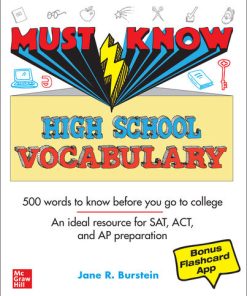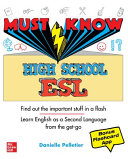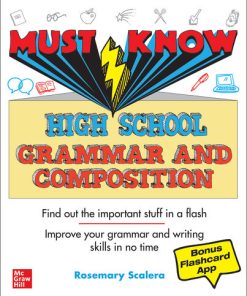(EBook PDF) Must Know High School ESL 1st edition by Danielle Pelletier Depinna 1264258666 9781264258666 full chapters
$50.00 Original price was: $50.00.$25.00Current price is: $25.00.
Must Know High School ESL 1st edition by Danielle Pelletier Depinna – Ebook PDF Instant Download/DeliveryISBN: 1264258666, 9781264258666
Full download Must Know High School ESL 1st edition after payment.

Product details:
ISBN-10: 1264258666
ISBN-13 : 9781264258666
Author : Danielle Pelletier Depinna
Must Know High School ESL 1st Table of contents:
1. Meeting People
Greetings
Responding to Greetings
Eye Contact and Facial Expressions
Introducing Yourself
Expressions to Use When Introducing Yourself
Body Language to Use When Introducing Yourself
Saying Goodbye
Small Talk
Topics for Small Talk
Success Strategy: Naming the Elephant
Simple Present Tense: Asking and Answering Questions
Forming Yes/No Questions
Forming Contractions
Answering Yes/No Questions
Forming Information Questions
Dialogues: Greeting and Meeting People
Lecture: Time Zones in the United States
Success Strategy: Strengthen Your Listening, Speaking, and Pronunciation
Exercises
2. Talking About Habits, Routines, Customs, and Schedules
Simple Present Verb Tense
Simple Present Tense: Forming the Affirmative
Pronunciation: Three –s Ending Sounds
Simple Present Tense: Forming the Negative
Simple Present Tense: Forming Contractions with the Negative BE Verb
Indicating Frequency
Expressions of Time
Simple Present Tense: Using Tag Questions
Using Intonation with Tag Questions
Using Affirmative or Negative with Tag Questions
Forming Tag Questions with a BE Verb
Forming Tag Questions with All Other Verbs
Answering Tag Questions
More on Tag Questions
Using the Simple Present Tense for Schedules
Vocabulary: Public Transportation and Schedules
Vocabulary: Expressions of Time Used for Schedules
Dialogue: Clubs in School
Lecture: Holiday Customs in the United States
Success Strategy: Shadowing—a Listening Technique
How to Shadow
Helpful Tips
Exercises
3. Describing People, Places, and Things
Describing Location and Quantity with There Is / There Are
Forming the Affirmative
Forming the Negative
Forming Yes/No Questions
Forming WH Questions of Location
Forming WH Questions of Quantity
Using Adjectives to Describe People, Places, and Things
Word Order
Comparatives and Superlatives
Using -ed and -ing Forms of Adjectives
Using Adverbs to Intensify
Using Adverbs to Limit
Using Imperatives
Forming Imperatives
Forming Negative Imperatives
Requesting and Giving Instructions and Directions
Asking for Instructions
Asking for Directions
Checking Your Understanding
Asking for Repetition
Paraphrasing to Check Your Understanding
Dialogue: At the Bus Station
Lecture: Languages in the United States
Success Strategy: Reading Comprehension Through Context Clues of Contrast
Exercises
4. Nouns and Pronouns
Nouns
Common Nouns vs. Proper Nouns
Count vs. Noncount Nouns
Nouns That Can Be Either Count or Noncount Nouns
Quantifiers with Noncount Nouns
Determiners with Nouns
How Many vs. How Much
Plural Count Nouns
Definite vs. Indefinite Articles
A vs. An
When to Use Definite and Indefinite Articles
Pronouns and Possessive Adjectives
Subject Pronouns
Object Pronouns
Possessive Adjectives
Possessive Pronouns
Reflexive Pronouns
Demonstrative Adjectives
Demonstrative Pronouns
Dialogue: The Science Lab
Lecture: Star Wars
Exercises
5. Talking About Ongoing Activities
Present Progressive Verb Tense
Forming the Present Progressive Tense
Expressions of Time
Present Progressive Tense: Forming the Affirmative
Present Progressive Tense Timeline
Present Progressive Tense: Forming the Negative
Forming Negative Contractions
Present Progressive Tense: Forming Yes/No Questions
Answering Yes/No Questions
Active vs. Stative Verbs
Verbs That Can Be Stative or Active
Present Progressive Tense: Forming WH Questions
Forming Who Questions
Present Progressive Tense: Using Tag Questions
Using Intonation with Tag Questions
Forming Affirmative and Negative Tag Questions
Using Articles
Dialogue: The Internship
Lecture: Carhenge
Success Strategy: Using Tracking
How to Track
Exercises
6. Talking About Past Activities
Simple Past Verb Tense
Simple Past Tense Timeline
Expressions of Time
Simple Past Tense: Regular vs. Irregular Verbs
The Most Common Irregular Verbs
Simple Past Tense: Forming the Affirmative
Forming Regular Verbs
Three Different Sounds for –ed Endings for Regular Verbs
Simple Past Tense: Forming the Negative
Forming Negative Contractions
Simple Past Tense: Forming Yes/No Questions
Answering Yes/No Questions
Simple Past Tense: Forming WH Questions
Forming Who Questions
Simple Past Tense: Using Tag Questions
Using Intonation with Tag Questions
Forming Affirmative and Negative Tag Questions
Dialogue: What Did You Do Last Weekend?
Lecture: The California Gold Rush
Success Strategy: Building Your Vocabulary
Exercises
7. Simple Sentences
Subject-Verb-Object (SVO)
How to Identify the SVO
Direct vs. Indirect Objects
Transitive vs. Intransitive Verbs
Subject-Verb-Complement (SVC)
How to Identify an SVC Sentence
Simple Sentences
Compound Subjects and Predicates
Patterns of a Simple Sentence
Simple Sentences vs. Compound Sentences
Lecture: The Grand Canyon
Success Strategy: Discovering Meaning with Context Clues for Examples
Exercises
8. Talking About Future Activities
Simple Future Verb Tense
Simple Future Tense Timeline
Expressions of Time
Choosing Which Form to Use
Simple Future Tense: Forming the Affirmative
Simple Future Tense: Forming the Negative
Forming Negative Statements and Contractions with BE going to
Simple Future Tense: Forming Yes/No Questions
Answering Yes/No Questions
Simple Future Tense: Forming WH Questions
Simple Future Tense: Using Tag Questions
How to Use Tag Questions
Forming Affirmative and Negative Tag Questions
Future Progressive Verb Tense
Choosing Between Simple Future and Future Progressive
Future Progressive Tense: Forming the Affirmative
Future Progressive Tense: Forming the Negative
Future Progressive Tense: Forming Yes/No Questions
Answering Yes/No Questions
Future Progressive Tense: Forming WH Questions
Answering WH Questions
Future Progressive Tense: Using Tag Questions
Forming Affirmative and Negative Tag Questions
Success Strategy: Asking for Repetition
Dialogue: Project Planning
Exercises
9. Connecting the Past and the Present
Present Perfect Verb Tense
Deciding When to Use the Present Perfect Tense
Choosing Among Present Perfect and Other Verb Tenses
Expressions of Time
Present Perfect Tense: Forming the Affirmative
Forming Past Participles: Regular Verbs
Forming Past Participles: Irregular Verbs
Present Perfect Tense: Forming the Negative and Contractions
Present Perfect Tense: Forming Yes/No Questions
Answering Yes/No Questions
Present Perfect Tense: Forming WH Questions
Forming Who Questions
Answering WH Questions
Present Perfect Tense: Using Tag Questions
Using Intonation with Tag Questions
Forming Affirmative and Negative Tag Questions
Present Perfect Progressive Verb Tense
Deciding When to Use the Present Perfect Progressive Tense
Present Perfect Progressive Tense: Forming the Affirmative
Present Perfect Progressive Tense: Forming Yes/No Questions
Answering Yes/No Questions
Present Perfect Progressive Tense: Forming WH Questions
Answering WH Questions
Present Perfect Progressive Tense: Using Tag Questions
Forming Affirmative and Negative Tag Questions
Choosing Among Present Perfect Progressive and Other Verb Tenses
Success Strategy: Agreeing and Disagreeing Politely
Success Strategy: Supporting Your Ideas
Dialogue: Class Discussion on School Uniforms
Lecture: School Uniforms
Exercises
10. Compound, Complex, and Compound-Complex Sentences
Compound Sentences
How to Identify a Compound Sentence
Complex Sentences
How to Identify a Complex Sentence
Adverb Clauses
Adverb Clauses of Time
Adverb Clauses of Condition
Modals
Adjective Clauses
How to Form Adjective Clauses
Relative Pronouns
Noun Clauses
Compound-Complex Sentences
Success Strategy: Talking About Similarities and Differences
Exercises
11.. Writing Paragraphs and Essays
The Writing Process
Considering Purpose
Prewriting
Drafting
Revising
Editing
Publishing
The Classic Five-Paragraph Essay Structure
Introduction
Body Paragraphs
Conclusion
Transitions
Example Writing Assignment
Example: Five-Paragraph Essay
Exercises
Answer Key
People also search for Must Know High School ESL 1st:
must know high school vocabulary
must know high school basic english
high school esl test
high school esl syllabus
high school esl curriculum
Tags:
Must Know,High School,ESL,Education,English,Danielle Pelletier Depinna
You may also like…
Reference - School Guides & Test Preparation
Biology and other natural sciences - Biology
Must Know High School Biology 2nd Edition Kellie Ploeger Cox
Languages - English as a Foreign Language & Reference
Must Know High School ESL 1st Edition Danielle 1264258666 9781264258666
Education Studies & Teaching - Higher & Further Education
Must Know High School Chemistry, Second Edition John T. Moore
Mathematics - Algebra
Mathematics - Geometry and Topology
Science (General)
Uncategorized












